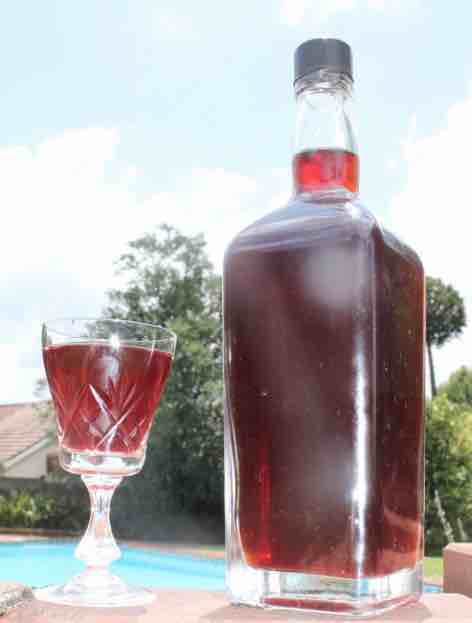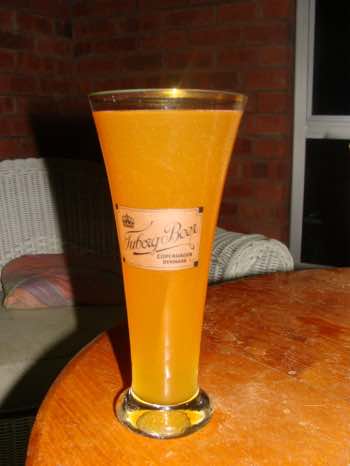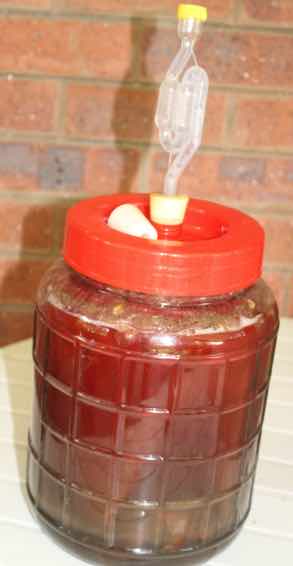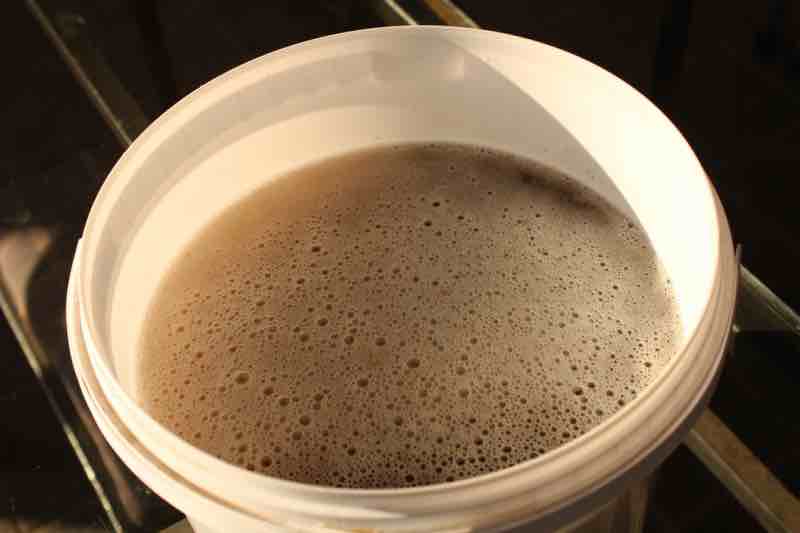- Homepage
- Pascal's wager
- Applying Pascals Wager to the Alcohol Causes Cancer Debate
Applying Pascal's Wager to the alcohol causes cancer debate.
Applying Pascal's Wager to the alcohol causes cancer debate may enable drinkers to enjoy their tipple without angst.
Blaise Pascal was a profound thinker and mathematician who lived four centuries ago. He is generally recognised today as being the father of what is known as "probability theory."
 Unpasteurised mulberry melomel
Unpasteurised mulberry melomelWhat is Pascal's wager?
We all have to make decisions, some small but others large on a daily basis where there is significant doubt. It's the rainy season; should I carry an umbrella on a windy day to work for example?
It is all about small losses versus potentially large gains; the irritation of a flapping umbrella compared to the chance of getting soaked through and freezing cold.
"There is strong evidence that alcohol causes cancer at seven sites in the body and probably others.
Current estimates suggest that alcohol-attributable malignant tumours at these sites make up 5.8% of all cancer deaths world-wide.
Confirmation of specific biological mechanisms by which alcohol increases the incidence of each type of cancer is not required to infer that it is a cause."
- National Library of Medicine, Addiction, 2017
How much alcohol causes cancer?
A far weightier matter than a flapping umbrella obviously is how much alcohol causes cancer?
There are over 200 strong studies confirming that even small amounts of alcohol will increase the risk of cancer particularly of the gut, liver and breast. Just one of those papers concluded that there are 17,000 new cases of malignant tumours in the UK each year caused solely by our favourite tipple; that's not small beer!
Even stronger is a so-called "meta analysis" where all scientifically eligible data is put together in a single study; disturbingly even one glass of commercial wine per week increases the risk of succuming to cancer.
However there are no animal studies confirming that alcohol causes cancer; so the question is whether it is the ethanol itself or some other chemical in the wine. For example could it be the fungicides that were sprayed on the grapes? Or the added sulphites that are used as a preservative when bottling?
Sulphites have already been given the dubious honour of the contact dermatitis award for the year 2024[4]; could they also be the cause of cancer from drinking wine?
Applying Pascal's Wager to the alcohol causes cancer debate.
This is how Pascal's Wager works.
If I continue to drink commercial alcohol there is a risk that I will get cancer. Or, no it's a right load of codswallop, people have been boozing for millennia; I refuse to stop.
According to the rules of Pascal's Wager you cannot sit on the fence; you have to make a choice.
So if you decide that commercial booze will indeed increase your chances of getting cancer which you dread, take some remedial action and if the researchers turn out to be correct, then the gains will be infinite. You may have just added ten healthy years to your life; and are less likely to have a car accident or fall and break a hip whilst tipsy.
If the scientists made a serious statistical error in coming to their conclusions, then you have missed out on a lifetime of the pleasures and perceived benefits of drinking alcohol; a small loss in comparison with ten lost years.
Pascal would argue that there is much to be gained in giving up commercial alcohol as compared with the risk of losing your life.
A sneaky way out
 Unpasteurised honey braggart beer
Unpasteurised honey braggart beerThere may be a sneaky way out; I emphasise that it not without risks. The scientists may ultimately be correct; alcohol could indeed be the villain of the piece.
The alternative may be to start brewing your own beer, wine or cider; or if you are a beekeeper even a mead. That would eliminate the risk of cancer if the added preservatives are the cause. But what if it's the herbicides used when growing the barley, the anti-fungal agents on the grapes or the Roundup in the honey?
A homebrew also is a powerful probiotic contributing to wellbeing rather than detracting from it; it is rich in friendly yeast cells that help to overwhelm pathogens like Candida.
"72% of American adults drink alcohol at least once a week; fewer than half realize that beer, wine and spirit use contribute to an increase in cancer risk."
- Medscape
Life is inherently dangerous; getting out of bed may be the greatest risk. Certainly stepping into a motor-vehicle or even hopping on a bicycle can lead to serious injury and death.
Overall lifestyle is the big factor; the researchers found that smoking and drinking commercial alcohol greatly enhanced the risk of cancer, for example.
Applying Pascal's wager to the alcohol causes cancer debate led me to accept that the overwhelming research was almost certainly correct. The great unknown was that no testing was done on non-commercial booze; there are so few people home brewing or drinking "natural wines" that conducting scientific studies is problematic.
"In the United States there are approximately 20,000 cancer deaths annually related to alcohol consumption, more than the number of alcohol-related motor vehicle collisions each year, which totals 13,500."
- Medscape
Blue Zones
 A Catawba grape mead[3].
A Catawba grape mead[3].Adding grist to the mill is that those living in the five Blue Zones of the world enjoy long, zestful lives despite drinking relatively large amounts of locally brewed, unpasteurised beers and wines; with no preservatives. Two or three glasses daily with a meal is the norm.
So our personal decision was to start brewing ciders, perries and meads; and a braggot beer. Based on our knowledge of the Blue Zones and an overall healthy lifestyle we think but are not totally certain that alcohol per se is probably not the spoke in the wheel.
 Fermenting a home-brew may be a way out
Fermenting a home-brew may be a way outNatural honey
The best natural honey is not from areas with commercial agriculture; the bees bring home various ecocides that are found in the nectar. Rather purchase from hives in villages and even the city; it's in general a lot cleaner. And that from forests where toxic poisons are much less likely to be used.
Honey with traces of ecocides may contribute to the alcohol causes cancer debate.
The material expressed on this page is gleaned from the nutritional and environmental literature; it is clearly referenced. A plain distinction is made between the author's opinion and that which is scientifically proven. When in doubt consult your health professional.
To suggest a correction or clarification, write to Dr Bernard Preston here. Contact.
"The International Agency for Research on Cancer now classifies alcohol as a Group 1 carcinogen along with tobacco, asbestos and formaldehyde."
Applying Pascal's Wager to the alcohol causes cancer debate.
Applying Pascal's Wager to the alcohol causes cancer debate may bring about one becoming abstemious; or to join those indulging in various types of home brewing.
When browsing use right click and "Open Link in New Tab" or you may get a bad gateway signal.
Newsletter
Our newsletter is entitled "create a cyan zone" at your home, preserving both yourself and Mother Earth for future generations; and the family too, of course. We promise not to spam you with daily emails promoting various products. You may get an occasional nudge to buy one of my books.
Here are the back issues.
- Lifestyle and ideal body weight
- What are ultra-processed foods?
- Investing in long-term health
- Diseases from plastic exposure
- Intensive lifestyle management for obesity has limited value
- A world largely devoid of Parkinson's Disease
- The impact of friendly bacteria in the tum on the prevention of cancer
- There's a hole in the bucket
- Everyone is talking about weight loss drugs
- Pull the sweet tooth
- If you suffer from heartburn plant a susu
- Refined maize meal and stunting
- Should agriculture and industry get priority for water and electricity?
- Nature is calling
- Mill your own flour
- Bake your own sourdough bread
- Microplastics from our water
- Alternative types of water storage
- Wear your clothes out
- Comfort foods
- Create a bee-friendly environment
- Go to bed slightly hungry
- Keep bees
- Blue zone folk are religious
- Reduce plastic waste
- Family is important
- What can go in compost?
- Grow broad beans for longevity
- Harvest and store sunshine
- Blue zone exercise
- Harvest and store your rainwater
- Create a cyan zone at your home
Did you find this page interesting? How about forwarding it to a friendly book or food junkie? Better still, a social media tick would help.
- Homepage
- Pascal's wager
- Applying Pascals Wager to the Alcohol Causes Cancer Debate
Address:
56 Groenekloof Rd,
Hilton, KZN
South Africa
Website:
https://www.bernard-preston.com